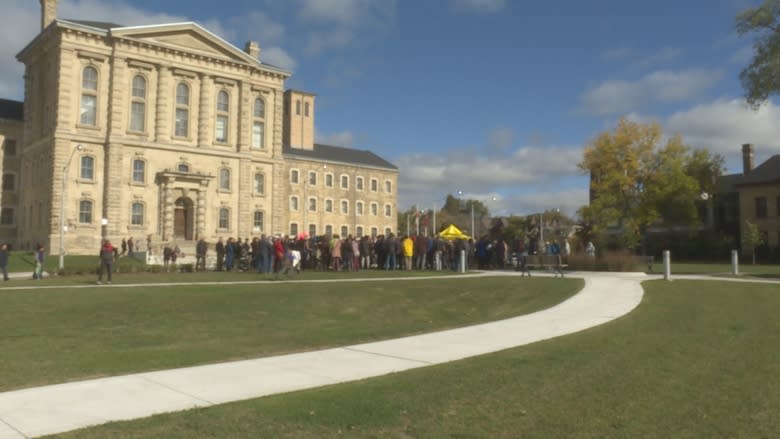New park honours groundbreaking black Toronto politician William Peyton Hubbard
At a time when blacks were not allowed in many Toronto hotels and restaurants, William Peyton Hubbard, the Canadian-born son of escaped American slaves, became one of the most influential politicians in the city.
Hubbard was first elected as a City Alderman in 1894 and served in various roles, including as acting mayor, until his retirement in 1914.
On Saturday, a park near Broadview on Gerrard Street East was officially named in his honour to recognized the contributions of Hubbard —the first ever non-white politician to be elected in a Canadian city.
Dozens of Hubbard's descendants joined Mayor John Tory, Councillor Paula Fletcher, historian Rosemary Sadlier and members of the Urban Alliance on Race Relations at the ceremony.
'He loved to have an audience'
Lorraine Hubbard, 62, his great-granddaughter who now lives in Coquitlam, B.C. won't be able to be there due to health reasons, but said a park named in his honour is a long overdue tribute.
"His contributions have been recognized in newspaper articles and books, but this really is the first permanent, very public recognition of him and his work because many politicians and people of significance who contributed to Toronto have streets or buildings named after them," she said.
Hubbard never met her great-grandfather, who died long before she was born — but her dad told her stories about the man Toronto newspapers compared to the Roman philosopher-politician Cicero.
"He loved to speak. He loved to have an audience. I recall my dad saying that at family gatherings — whether it was a birthday or Christmas — the family would be gathered around the dining room table and he would make these very long speeches that went on for ever and ever and ever. And my father and his sister just wanted to go play with their cousins."
From baker to politician
W.P. Hubbard started his career as a baker, and then drove a taxicab. He didn't embark on a political career until he was 51 years old, when on his second attempt, he was elected in Ward 4, which stretched from University Avenue and Bathurst Street and was one of wealthiest and whitest wards in the city. Voters there returned him to office 14 times.
Among his accomplishments, Hubbard is credited with helping keep the Toronto's hydroelectric and water systems as public utilities when others were trying to privatize them. His efforts led to the creation of Toronto Hydro. Hubbard was appointed to the city's powerful four-member Board of Control — which was the city's executive level — and served as acting mayor.
Hubbard is also a recurring character in two episodes of CBC Television's "Murdoch Mysteries" which takes place in Toronto during the 1890s.
"It's important for young people to know that these things were accomplished and were influential in the life and history of the city and that they can strive for these things in the future," said Lorraine Hubbard. "I do hope it gives them some encouragement and confidence."
Councillor Paula Fletcher (Ward 30) said constituents submitted 90 names for the new park — near the recently renovated Don Jail and new Bridgepoint Active Healthcare Centre. Seven finalists were selected and went to a Name Our Park online vote. The top two finalists were Hubbard Park and Jack Layton Park.
"It's fantastic. It rose out of the community it was chosen by the community," said Fletcher. "[Hubbard] was an important part of Toronto's history, but he's hidden from history. There's no major piece of city infrastructure that recognizes [his accomplishments]."
Hubbard matters not only as a part of Toronto's early civic history, but as someone who broke through racial barriers considered insurmountable at that time, said Fletcher.
Hubbard died in 1935 at the age of 93, in his home not far from the park that bears his name. A historic plaque stands before the still-grand house on Broadview, just south of The Danforth.



